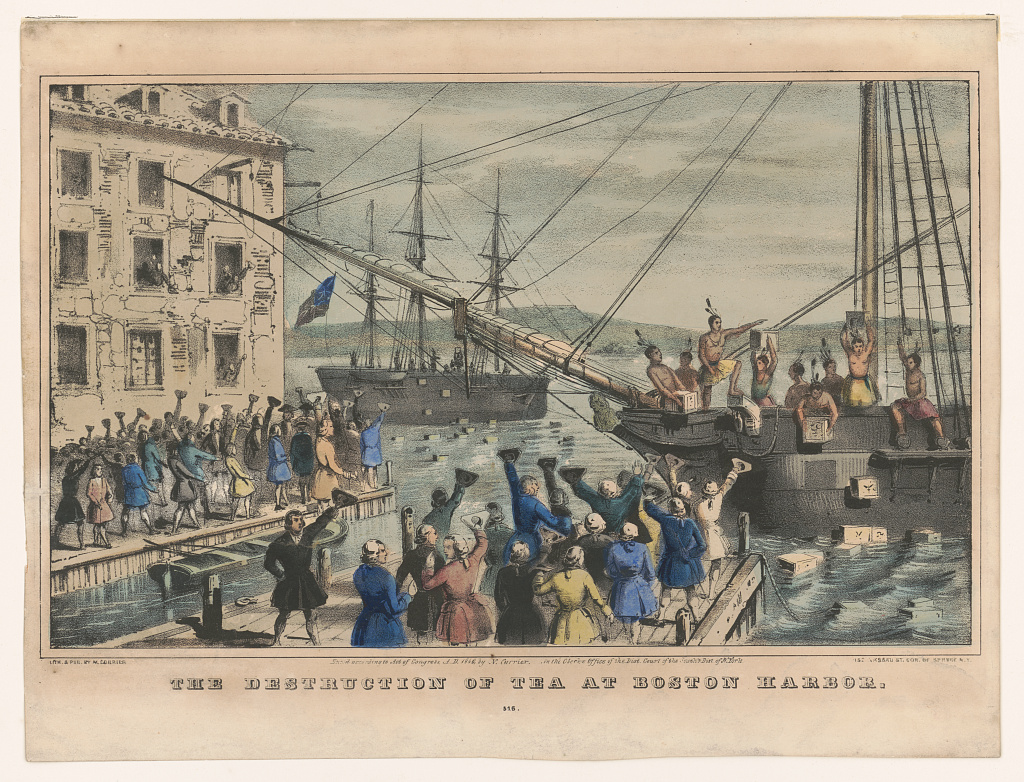Note: The following is the second in a series of eleven weekly posts that present my attempt to answer the question, “How does history connect Westborough and India?” See the Introduction for an overview of the series and to start reading it from the beginning.
–Anthony Vaver, Local History Librarian, Westborough Public Library
Tea
“What misery this right of taxation is capable of producing in a provincial government. We need only recollect that our countrymen in India, have in the space of five or six years, in virtue of this right, destroyed, starved and driven away more inhabitants from Bengal, than are to be found at present in all our American Colonies.”
–Jonathan Shipley, from a speech intended for the House of Lords during debate over altering the Massachusetts charter in 1774 and subsequently published and distributed in the American colonies by Benjamin Franklin.
In 1771, the East India Company bought shiploads of tea on credit in the hope that it could reverse deficits created by the drop in tax collections due to the famine in Bengal. Over twenty ships carrying 90,000 chests of tea arrived in London that summer, more than twice as much tea as the British could consume in a year—and Great Britain had not even finished consuming the tea that had been shipped the year before! With its tea sitting in the harbor, its coffers empty, and with creditors demanding payment, the East India Company was nearly broke. The British government deemed the company too big and too important to fail, so Parliament passed the Tea Act of 1773, which gave license to the East India Company to corner the market on tea in the American colonies and tax it at the same time, moves that that would ultimately prove to be disastrous in England’s ability to maintain control over the American colonies.
The Tea Act of 1773 was passed around the same time that American newspapers were carrying reports about the high rates of taxation imposed by the British on Bengal, the ruthless measures put in place to maximize those tax collections, and the famine that resulted from these policies. American colonists naturally wondered whether the British government intended to impose similar imperial administrative rule on their part of the world, and if so, what would prevent America from experiencing a similar fate?
To protest the passage of the Tea Act, a group of rebels threw the excess tea that the East India Company had shipped to America into Boston Harbor, and the British government responded by passing the Intolerable Acts in 1774, which closed the ports in Boston, fundamentally changed the charter of Massachusetts, and consequentially led to rebellion with Westborough and Worcester leading the charge.

by N. Currier (Firm)
(Library of Congress, https://www.loc.gov/pictures/item/91795889/)
This 1846 picture fancifully depicts the destruction of East India Company tea in Boston Harbor to protest its taxation in 1773.
* * *
Read the next post in the series: Rebellion.
Westborough-India Series Bibliography
Beckert, Sven. Empire of Cotton: A Global History. New York: Vintage Books, 2014.
Bunker, Nick. An Empire on the Edge. New York: Vintage Books, 2014.
Collingham, Lizzie. Taste of Empire: How Britain’s Quest for Food Shaped the Modern World. New York: Basic Books, 2017.
Darwin, John. Unfinished Empire: The Global Expansion of Britain. New York: Bloomsbury Press, 2012.
Eacott, Jonathan. Selling Empire: India in the Making of Britain and America, 1600-1830. Chapel Hill, NC: U of North Carolina P, 2016.
Frankopan, Peter. Silk Roads: A New History of the World. New York: Vintage Books, 2015.
Freeman, Joshua B. Behemoth: A History of the Factory and the Making of the Modern World. New York: W. W. Norton & Company, 2018.
Schama, Simon. Civilizations. PBS television series, 2018. http://www.pbs.org/civilizations/home/.
Vaver, Anthony. The Rebellion Begins: Westborough and the Start of the American Revolution. Westborough, MA: Pickpocket Publishing, 2017.
Wilson, Jon. The Chaos of Empire: The British Raj and the Conquest of India. New York: Public Affairs, 2016.